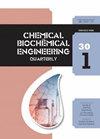含PEG和葡聚糖聚合物的纳米颗粒双水相体系中香兰素分配和回收的增强作用
IF 0.9
4区 生物学
Q4 BIOTECHNOLOGY & APPLIED MICROBIOLOGY
引用次数: 0
摘要
香兰素广泛应用于食品、医药和制药行业,需要改进成本效益高、环境友好的提取工艺,以满足日益增长的工业需求。为了应对这一挑战,我们对掺入聚乙二醇(PEG)和葡聚糖(DEX)的基于纳米颗粒的双水相系统(ATPS)进行了研究。主要目标是开发一种非碱性、在温和环境条件下运行、无毒且具有成本效益的ATPS。该研究的重点是确定一种合适的纳米颗粒,该纳米颗粒可以改善香兰素在ATPS中的分配,并促进经济上有利的分离过程。评价了各种纳米颗粒作为增强香兰素分配的添加剂。研究了聚合物重量百分比和DEX分子量等参数对香兰素分配和回收率的影响。此外,在由6.5wt%PEG6000和7.8wt%DEX15000组成的优化系统中评估了掺入不同纳米颗粒的影响。结果表明,在最佳体系中仅添加0.001g银纳米颗粒,分配系数提高了42%,香兰素回收率提高了约8%本文章由计算机程序翻译,如有差异,请以英文原文为准。
Enhancement of Vanillin Partitioning and Recovery in Nanoparticle-based Aqueous Two-phase System Containing PEG and Dextran Polymers
Vanillin, widely utilized in the food, medicinal, and pharmaceutical industries, re-quires an improved extraction process that is cost-effective and environmentally friendly to meet the growing industrial demand. To tackle this challenge, we conducted an inves-tigation on a nanoparticle-based aqueous two-phase system (ATPS), incorporating polyethylene glycol (PEG) and dextran (DEX). The primary objective was to develop an ATPS that is non-alkaline, operates under mild environmental conditions, and is both non-toxic and cost-effective. The study focused on identifying a suitable nanoparticle that could improve the partitioning of vanillin in ATPS and facilitate economically favorable separation processes. Various nanoparticles were evaluated as additives to enhance vanillin partitioning. The study explores the influence of parameters, such as polymer weight percentages and DEX molecular weight on vanillin partitioning and recovery percentage. Additionally, the impact of incorporating different nanoparticles was assessed in the optimized system composed of 6.5 wt% PEG6000 and 7.8 wt% DEX15000. Results indicate that the addition of only 0.001 g of silver nanoparticles to the optimal system improved the partition coefficient by 42 % and the vanillin recovery percentage by ap-proximately 8 %
求助全文
通过发布文献求助,成功后即可免费获取论文全文。
去求助
来源期刊
CiteScore
2.70
自引率
6.70%
发文量
23
审稿时长
>12 weeks
期刊介绍:
The journal provides an international forum for presentation of original papers, reviews and discussions on the latest developments in chemical and biochemical engineering. The scope of the journal is wide and no limitation except relevance to chemical and biochemical engineering is required.
The criteria for the acceptance of papers are originality, quality of work and clarity of style. All papers are subject to reviewing by at least two international experts (blind peer review).
The language of the journal is English. Final versions of the manuscripts are subject to metric (SI units and IUPAC recommendations) and English language reviewing.
Editor and Editorial board make the final decision about acceptance of a manuscript.
Page charges are excluded.

 求助内容:
求助内容: 应助结果提醒方式:
应助结果提醒方式:


